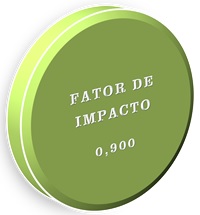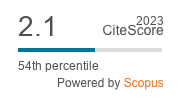DIVERSITY AND GROWTH-PROMOTING ACTIVITIES OF Bacillus sp. IN MAIZE
Palavras-chave:
Rhizobacteria. Zea mays. Plant nutrition. RAPD-PCR.Resumo
The aim of this paper was to evaluate biochemical activities related to promotion of plant growth of isolates of the genus Bacillus originated from areas under maize cultivation, and to evaluate the genetic similarity among the isolates using PCR-based RAPD markers. Several strains of the genera Bacillus were isolated from twenty distinct maize production areas of the State of São Paulo, Brazil. Forty isolates were obtained and characterized as antagonistic to plant pathogenic fungi, production of auxin (IAA), phosphate solubilization in vitro and root colonization. The potential for phosphate solubilization was not identified in any of the isolates. In addition, the majority of the isolates did not show any antagonistic effect against Fusarium oxysporum and Colletotrichum truncatum. Based on root colonization, six Bacillus isolates were selected to evaluate their growth-promotion activities in maize. All the six isolates increased root growth, while only one isolate did not promoted shoot growth and nutrient uptake in plants when compared to control. Low genetic similarity among the selected isolates was detected by RAPD analysis using eleven primers. Our results showed the utility of the in vitro selection criteria used in this study for screening of Bacillus sp. with plant growth-promoting activity, as they may reduce the number of Bacillus isolates required at the final screening stage in field.Downloads
Downloads
Publicado
Edição
Seção
Licença
Os Autores que publicam na Revista Caatinga concordam com os seguintes termos:
a) Os Autores mantêm os direitos autorais e concedem à revista o direito de primeira publicação, com o trabalho simultaneamente licenciado sob a Licença Creative Commons do tipo atribuição CC-BY, para todo o conteúdo do periódico, exceto onde estiver identificado, que permite o compartilhamento do trabalho com reconhecimento da autoria e publicação inicial nesta revista, sem fins comerciais.
b) Os Autores têm autorização para distribuição não-exclusiva da versão do trabalho publicada nesta revista (ex.: publicar em repositório institucional ou como capítulo de livro), com reconhecimento de autoria e publicação inicial nesta revista.
c) Os Autores têm permissão e são estimulados a publicar e distribuir seu trabalho online (ex.: em repositórios institucionais ou na sua página pessoal) a qualquer ponto antes ou durante o processo editorial, já que isso pode gerar alterações produtivas, bem como aumentar o impacto e a citação do trabalho publicado (Veja O Efeito do Acesso Livre).







